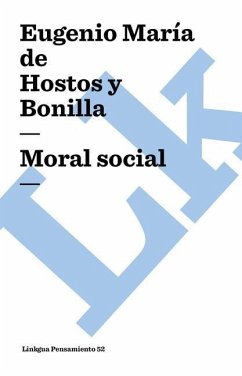Moral social es una exposición del pensamiento caribeño, de la integración latinoamericana de Eugenio María de Hostos, y del fortalecimiento de la moral y la educación como única vía para redimir a los pueblos del Nuevo mundo. Hostos fue un pensador moralista, cuyas ideas se proyectan en sus escritos, que buscan en su esencia, una ética pedagógica de la educación. Moral social fue publicada en 1888. En el prólogo, Hostos explica que solamente por la insistencia de sus discípulos accedió a que se publicara este libro porque no hay que publicar la moral en libros, sino en obras. La obra está dividida en dos partes. En la primera, el autor presenta las bases teóricas sobre las que se sustentan sus ideas. En la segunda, aplica esas ideas a casos concretos y hace sus sugerencias morales. Según sus ideas, hay una existencia moral muy distinta de la existencia física, que, aunque no sea distinta en esencia, se nos manifiesta de distintos modos. Así Hostos llega a la conclusión de que: Todo proceder de la razón de menos a más es proceder de menos conciencia a más conciencia, y en vez de hacerse más consciente a medida que se hace más racional, el hombre de nuestra civilización se hace más malo cuanto más conoce el mal. La figura y los escritos de Hostos resultan particularmente interesantes como expresión de la peculiar situación socio-histórica antillana de la segunda mitad del siglo XIX, ya que Hostos se abocó, a través de la teoría y de la acción, a trabajar por la independencia, la reforma educativa y la dignificación de la cultura caribeña, en particular de Puerto Rico, su patria. Su trabajo e ideas han influido en el discurso intelectual de América Latina por más de 125 años, haciendo una tremenda contribución a la identidad, la cultura y el desarrollo político caribeño.
Hinweis: Dieser Artikel kann nur an eine deutsche Lieferadresse ausgeliefert werden.
Hinweis: Dieser Artikel kann nur an eine deutsche Lieferadresse ausgeliefert werden.

